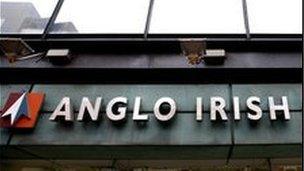Sordid financial love triangle at the heart of Anglo debt problem
- Published

The Irish Central Bank handed Anglo 30.6bn euros (£26.3bn)
The debt burden at the former Anglo-Irish Bank is a messy legacy of the Irish government's hurried bank bailout in 2010.
Its restructuring is proving to be a sticky affair too.
Initially, the deal to secure Anglo and shore up its financial position was a financial love triangle involving the "bad bank", the Dublin government and the Irish Central Bank.
The Irish Central Bank handed Anglo 30.6bn euros (£26.3bn).
It did this through a scheme called Emergency Liquidity Assistance - it created the money from nowhere and passed it on to Anglo.
But the Republic of Ireland is part of the Eurozone and is not allowed to magic money from nowhere - that is the job of the European Central Bank.
So, to keep within the rules, Anglo had to have something on its books as collateral to balance the amount given to it by the Irish Central Bank.
That is where the Irish government entered with its gigantic IOU - or Promissory Note. It promised to pay 30.6bn euros (£26.3bn) to Anglo over a 15-year period so that it could pay back the Central Bank.
Money 'disappearing'
On the original repayment plan, the government would give Anglo 3.1bn euros (£2.6bn) next month to pass on to the Central Bank.
Again, under ECB rules, that money would then be destroyed - not euros being physically burnt, but numbers deleted from a spreadsheet. Nonetheless, that is real taxpayers' money disappearing.
And that would continue for the next decade - sending amounts equivalent to around 2% of the country's economic output up in smoke each year. The new plan should reduce that payment considerably, but the details have yet to emerge.
It is not hard to see why this has become such a controversial issue. Without a deal to restructure, the coalition government could fall and Ireland's gold star performance within the bailout programme could be threatened.
A deal could strengthen the government and its international standing and allow Ireland to exit its bailout programme swiftly this year.
But the remaining stumbling block is the attitude of the ECB. It needs to approve the scheme as it has implications for other bailout countries using Emergency Liquidity Assistance, like Spain.
It cannot allow a precedent that writes off debt or has the same effect as allowing a Eurozone country to print its own money.
So, all eyes will be on Frankfurt on Thursday where the ECB is meeting.